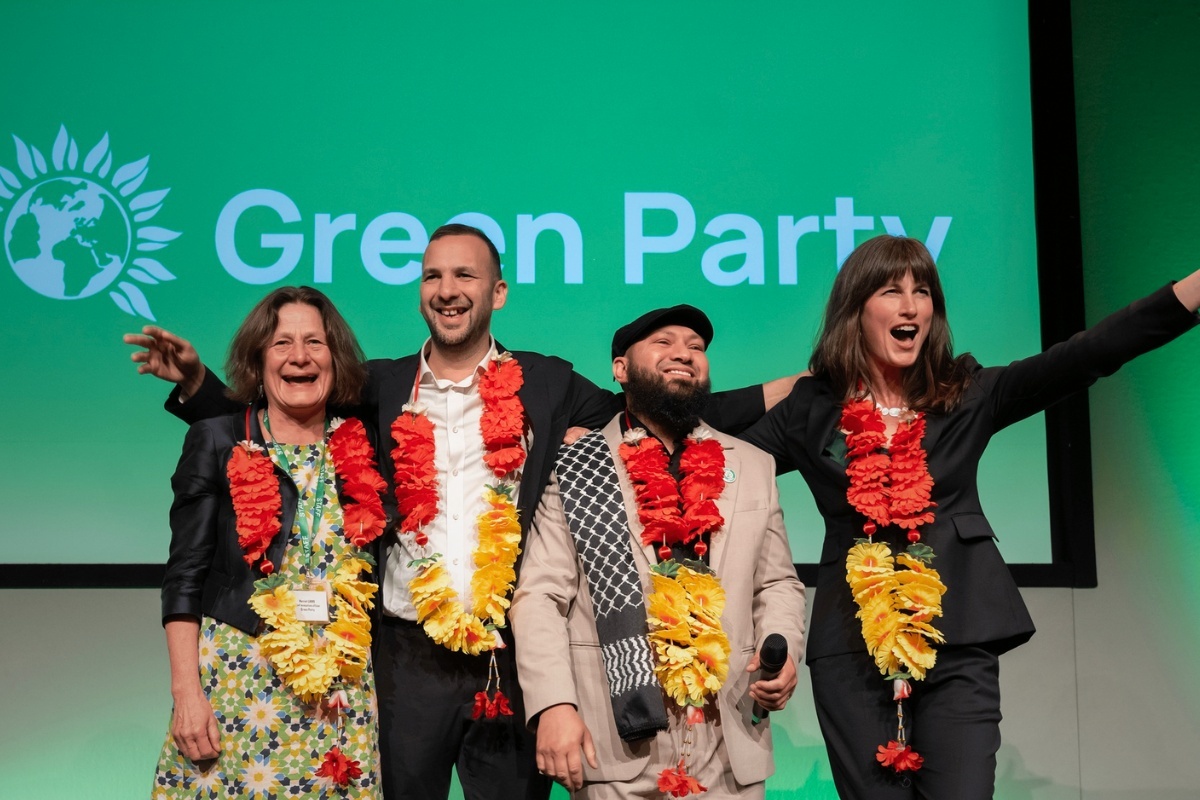The Green Party’s annual conference would usually have passed by as a political afterthought. But not this year.
Continuing the trend set by his eye-catching leadership bid, Zack Polanski has come out swinging: attacking Starmer’s hated Labour government and its enabling of Farage’s Reform UK; firmly calling out Israel’s genocide in Gaza, calling for the IDF to be proscribed as a terrorist organisation; and doubling-down on his efforts to transform the Green Party.
Amidst scenes of jubilation, standing ovations, and Polanski literally running into the conference hall to deliver his speech, it’s no wonder many are sensing real momentum behind the Greens recently.
Surge in support
Importantly, all of this momentum is translating into real support. At the time of writing, the party just hit a record 100,000 members – a 55 percent increase since Polanski became leader in September.
Over 1,000 new people are reportedly joining each day. This is against 86,000 when the conference ended, and 58,000 last December.
📈 Will the Polanski bounce ever end??
💚 The Green Party are 1st with 18-24s, whether it’s rent controls, tuition fees or taxing the rich we are the political home for young people in England and Wales.
🤔 sooo have you joined yet?https://t.co/FKMP9syxIQ pic.twitter.com/nX4VERovoM
— Young Greens 🌱 (@YoungGreenParty) October 15, 2025
To put that into perspective, the Greens’ membership has surged past the Liberal Democrats (90,000 members), and are hot on the heels of the flailing Tory Party (123,000 members).
Discounting Corbyn’s troubled new party, which hasn’t released an official membership figure yet, Polanski’s Greens are on track to become the third largest political party in the UK, behind Labour and Reform.
Standing in front of a podium adorned with the words “Bold Politics”, Polanski made clear that this conference would set the tone for a new kind of Green Party.
Instead of the traditional Green priorities – commonly perceived as middle-class environmentalism and NIMBYism – there would now be a wider “focus on the cost of living, and inequality and the climate crisis”.
Now, talk of ending inequality, abolishing landlordism, and blaming the billionaires is at the top of their agenda. This deeply resonates with a section of workers and youth who are yearning for a class-based programme.
The shift in focus towards bold, left-wing, anti-austerity politics no doubt chimes with a large layer of youth who now detest the Tory-lite, billionaire-backed politics of Keir Starmer and co, as well as those who want to challenge Farage’s right-wing populism with a fighting anti-establishment alternative on the left.
In the month since I was elected leader of the Green Party, we have gained a new member equivalent of every single minute. 24/7.
We’re all smiling. But we’ve also got a big job to do.
Let’s make hope normal again.https://t.co/0qbagSvIYp pic.twitter.com/HRRvpm8F6t
— Zack Polanski (@ZackPolanski) October 15, 2025
Where is this surge coming from?
Capitalism’s deep economic crisis has completely upended Britain’s political status quo. Since inheriting the country’s ailing economy at the last election, Labour have piously sung from the Tories’ hymn sheet, continuing their crippling austerity and militarism, while ramping-up state repression.
Meanwhile, Starmer has become practiced in aping Reform’s anti-migrant rhetoric – attempting to set one section of the working class against another in a battle over crumbs.
The result is the most unpopular Labour government in history, and Starmer well on his way to becoming the most hated man in Britain.
All of this provided fertile ground for a left alternative that could channel anger and opposition towards Starmer’s Labour, the crisis in Palestine, and the rise of Reform.
For a short time, a few months ago, it seemed like Corbyn and Sultana’s ‘Your Party’ might have filled that gaping vacuum. They certainly had all of the tools at their disposal to do so.
But with their recent bickering, dithering, and delaying, they seem to have squandered a great deal of the enthusiasm that they had garnered. And an insurgent Polanski was well-placed to steal their limelight – appearing confident, decisive, and serious in comparison.
It remains to be seen whether Corbyn and Sultana can salvage their ill-fated project. And if they do, it’s unclear how the Greens will relate to ‘Your Party’. But that is music of the future.
What’s important now is that the Greens have burst onto the political scene as a formidable force, which cannot be ignored.
The party has attracted the highest percentage of Labour defectors, particularly amongst the youth. This has contributed not just to a surge in membership, but also to the fact that the party ranked second nationally in a YouGov poll – with 17 percent viewing the party favourably, behind only Reform at 27 percent.
💚 Greens are on the rise everywhere!
📈 New polling from YouGov shows the Green Party is viewed more favourably than any other party in London and among younger voters.
💪 And we’re just getting started. Join the Green Party today ⤵️ pic.twitter.com/oFJNGFUT97
— The Green Party (@TheGreenParty) October 6, 2025
Further still, this percentage shoots up when looking at London, where the Greens take the top spot at 27 percent (rising further to 36 percent amongst people aged 18-24). Altogether, this augurs badly for Labour, and once again highlights the huge appetite for bold politics.
Added to this, the Greens are now polling at an average of 10 percent, the highest figure in the party’s history.
This growth in membership and popularity is no accident. Polanski’s Green Party is making an audacious gambit to fill the vacuum on the left of British politics, with a programme that speaks to the needs of the working class.
Abolish landlords?
The Greens’ programme unfolded over the course of the conference with speeches touching on the need to nationalise public utilities, end “rip-off Britain” as well as fund public services with a “wealth tax”.
Motions which may have raised significant internal controversy in the past – such as the provocatively-named “abolish landlords” policy – passed with enthusiastic support.
The Green Party want to Abolish Landlords and the media are losing their minds about it!
Anyone can see this policy is desperately needed.
We need to build millions of council houses, cap rents, make homes fit for the future and we need the end landlord profiteering. pic.twitter.com/x9TKhi3KZn— Greens Organise (@GreensOrganise) October 15, 2025
Whilst all of this makes for a lively and energetic conference, there are still serious limitations to the real potential of this new programme.
Radical-sounding policies like “abolish landlords” can provoke an amusing hue-and-cry from the right-wing press – inadvertently generating more enthusiasm! – but this must be backed up with real content, and a serious explanation for how this can be achieved.
But Carla Denyer, the party’s housing spokesperson, revealed the hollowness of this plan herself, when she quickly added that “while the motion to conference had an eye-catching name, it does not actually ‘abolish’ landlords”.
Rather, the Greens’ plan for ending Britain’s housing crisis treads familiar ground: rent controls, abolishing ‘Buy to Let’ mortgages, imposing higher taxes on landlords, and giving councils the power to buy private landlords’ properties at a reduced rate if they don’t meet insulation requirements, or have been empty for more than six months.
Some of these measures could, if implemented, improve the lives of workers and families across Britain. Fighting for rent controls and more council housing – particularly through using class-struggle methods – would be a serious challenge to the capitalist class, who enrich themselves through the property market at our expense.
But what Denyer says is true. These policies are much less ‘abolish’ and much more ‘gently begin to phase-out’. Such mild-mannered regulations and tweaks are really at odds with the full extent of the housing crisis, which one source describes as a deficit of 4.3 million homes.
At worst, trying to tame the tiger of the market can backfire. We have seen this with attempts to regulate rents in New York, which have in some cases led to private landlords hitting back by taking properties off the market, thereby raising rents.
The fact of the matter is that Britain’s housing crisis cannot be solved within the narrow limits of capitalism. As long as housing is left to the vicissitudes of the market, and the largest construction companies and banks remain in private hands, it’s profit – not need – which will remain the number one priority.
Instead of the soft-touch of higher taxes on landlords (which will only be passed on to renters in the long run), or patiently waiting for landlords to sell their squalid housing whilst already-bankrupt councils are left to foot the bill, we should set our sights on expropriating the parasites and speculators who profit from this crisis.
This means moving beyond the careful words of “empowering tenants” and “improving their wellbeing” by “increas[ing] the proportion of socially rented homes”.
To really abolish landlordism, we must fight for a full socialist programme: expropriating all the empty properties hoarded by the super-rich speculators; nationalising all land, alongside the big banks, developers, and construction companies; and carrying out a nationwide programme of council-house building and renovation, under democratic workers’ control.
Will it be enough?
So far, these kinds of eye-catching policies have certainly contributed to the Green Party’s growth as a point of reference for the widening layer of society who are sick to death of poverty and austerity.
Whilst co-deputy leader Rachel Millward correctly stated “if we’re bold, we’ll get people”, boldness based on a vague “politics of hope” is not enough.

When Polanski is taking the fight to Starmer and Labour as the “handmaidens” of Reform, and overtly talking about public ownership – this is when he’s at his most popular.
Yet, it remains to be seen if these new members will be satisfied with Polanski’s promise to mobilise this base merely to win local elections, and gain a few more MPs in the Commons.
What’s more, if Polanski doesn’t move beyond a reformist outlook and strategy, his party will inevitably be plagued by all of the same problems that afflicted the Corbyn movement in the 2010s.
Now more than ever, young people are looking for fundamental solutions to their most pressing needs. They are looking beyond the sham ‘democracy’ on offer at Westminster, and towards the inspiring examples set by their brothers and sisters in Nepal, Morocco, and Madagascar.
Let’s remember that half of young Britons want a revolution – to burn the whole system down altogether!
All those who have recently flooded into the Green Party have not done so blindly. Polanski needs to follow-through his bold talk with bold action to continue winning their support.
Here at the Revolutionary Communist Party, we welcome this latest expression of the radical mood brewing in society. But we also point out that the problems Polanski is highlighting require revolutionary, working-class solutions on an international level. Taxing the rich won’t be enough.
We will continue to provide analysis and comradely critique of the Greens’ programme, and we look forward to continuing discussions with Green supporters and sympathisers – on the street, in workplaces and universities, and within the movement.






